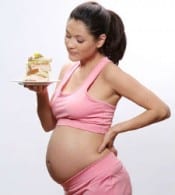Eating Habits During Pregnancy will Change
When you are pregnant, you are eating for two which means your eating habits change. Make sure the change is a healthy one. Here are 10 reasons why your eating habits during pregnancy will change:
1. Nutritional Needs and Intestinal Function Change.
Your body needs more nutrients to feed your growing baby.
2. Body Cravings Change
Remember that you must match all of your cravings with your knowledge of good nutrition.
3. Portion Sizes Change
Eating lighter, smaller portions more slowly, and more frequently is one of the eating habits during pregnancy that will most likely agree with your upset stomach. There will be days when you graze like a toddler, snacking all day long. Sometimes you’ll satisfy the “always hungry” feeling by eating all the time.
4. Calorie Needs Change
You will need to eat an extra 300-500 calories per day to ensure adequate nutrition for both of you.
5. Eating Habits during Pregnancy Need to Include Specific Nutrients
Your pregnant body needs specific nutrients: proteins, carbohydrates, fats, vitamins, minerals (mainly calcium and iron), and water. “Balancing” your nutrition during pregnancy means trying to get the right mix of these nutrients: 15% of your calories from proteins, 50-60% from carbohydrates, and 20-30% from fats, plus the recommended daily allowance (RDA) of vitamins and minerals.
6. Your Need for Fats Changes
Your eating habits during pregnancy need to include fats. Besides being a valuable source of energy, certain fats (called essential fatty acids) are necessary building blocks of vital tissues, especially the brain and nervous system. However, all fats are not created equal. The best nutrition is found in the fats of fish, nuts, avocados and all vegetable oils. Less healthy, but still necessary, fats are found in dairy products. Least healthy and least necessary fats are those that come from meat.
7. Your Need for Cholesterol Changes
Your pregnant body and your developing baby need extra cholesterol. Growing little brains need cholesterol. Cholesterol is also a building block for pregnancy hormones. Pregnancy hormones make and metabolize cholesterol anyway, so it’s natural for cholesterol levels to increase during pregnancy.
8. Your Protein Needs Change
Proteins are the structural element of your body and the body of your growing baby. Your baby’s tissues and organs grow by piling up millions of proteins on top of each other until each organ has reached full growth. Your eating habits during pregnancy must include protein. Try these food combinations to get complete proteins:
- Cheese sandwich (whole grain and dairy)
- Cereal and milk (grain and dairy)
- Whole wheat pasta and cheese (whole grain and dairy)
- Peanut-butter sandwich (whole grain and legume)
- Granola and yogurt (grain and dairy)
- Bean or lentil soup with whole wheat or rice crackers (legume and whole grain)
- Rice pudding (grain and dairy)
- Beans and rice (legume and grain)
- Pasta with meat sauce (grain and meat)
- Broccoli in cheese sauce (grain and dairy with some veggie protein mixed in)
9. Your Carbohydrate Needs Change
Best sources of complex carbohydrates are: pasta, potatoes, grains, legumes, nut butters and seeds. The time-released complex carbohydrates along with fructose and lactose provide slow, steady energy and give the feeling of fullness longer, resulting in steadier blood sugar levels and a greater overall feeling of well being.
10. Your Iron Needs Change
Iron is necessary to make the extra blood you need to nourish your baby and to make the billions of red blood cells the baby needs. Insufficient iron (anemia) or “tired blood” makes for a tired mom. Most women’s eating habits during pregnancy needs to include double the amount of iron they usually eat, taking in at least 60 milligrams of elemental iron each day, more if anemic or carrying multiples. It is nearly impossible to consume enough dietary iron while pregnant without eating excess calories. If iron upsets your already upset stomach, ask your doctor if you can safely delay taking iron supplements until after your morning sickness subsides, since the greatest demand for iron is in the second half of your pregnancy.

